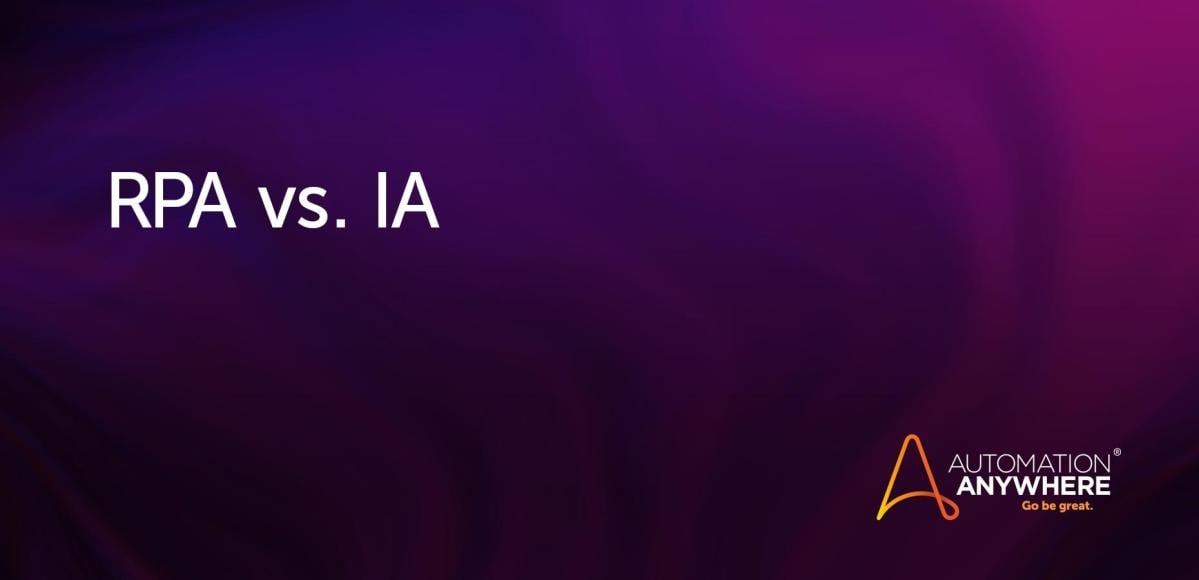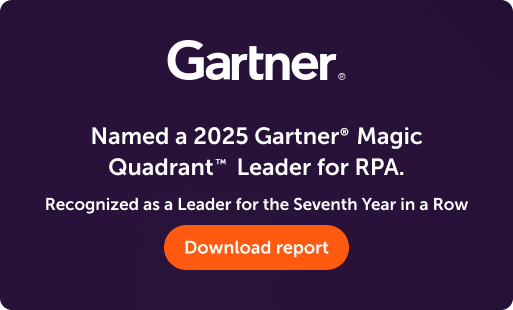- Login
- Search
- Contact Us
-
Have a question? Our team is here to help guide you on your automation journey.
-
Explore support plans designed to match your business requirements.
-
How can we help you?
-
- AI
AI Without the Hype From pilot to full deployment, our experts partner with you to ensure real, repeatable results. Get Started
- Automation Anywhere AI
-
- Solutions
Featured Agentic Solutions
Accounts Payable Invoice automation—No setup. No code. Just results. Accounts Payable
Customer Onboarding Scale KYC/AML workflows. Customer Onboarding
Customer Support Keep queues moving, even at peak load. Customer Support
Healthcare RCM Revenue cycle management that runs itself. Healthcare RCM
- Products
Platform Features
- Agentic process automation (APA)
- Robotic Process Automation (RPA)
- View all Products
-
- Resources
Get Community Edition: Start automating instantly with FREE access to full-featured automation with Cloud Community Edition.
Featured
 Named a 2025 Gartner® Magic Quadrant™ Leader for RPA.Recognized as a Leader for the Seventh Year in a Row Download report Download report
Named a 2025 Gartner® Magic Quadrant™ Leader for RPA.Recognized as a Leader for the Seventh Year in a Row Download report Download report- Become an Expert
- Developer Tools
- Get Support
- View all resources
-
- Partners
Find an Automation Anywhere Partner Explore our global network of trusted partners to support your Automation journey Find a Partner Find a Partner
- Find a Partner
- For Partners
-
Blog
Intelligent Automation: The Next Step in Digital Transformation
Share this:
Process automation is on the minds of business leaders everywhere, and for good reason. Business today happens at an accelerated pace, and customer expectations are at an all-time high.
When the reality is that every business faces a very real danger of commoditization or marginalization at the hands of a savvy competitor, customer experience quickly becomes the holy grail of corporate excellence.
Companies must be more agile, more adept at gleaning and using real-time data, and more attuned to customer needs and desires than ever before. The only way to keep up is to embrace automation.
It’s no surprise that the adoption of Robotic Process Automation (RPA) has increased at lightning speed across the enterprise, but it’s intelligent automation (IA) that is the next logical step for companies that have begun their digital transformation journey.
Robotic Process Automation vs. intelligent automation
RPA has reached the tipping point. The Futurum State of Automation 2019 report, created in partnership with Automation Anywhere, surveyed 1,000 business leaders across North America who reported adoption of either RPA or some form of artificial intelligence (AI)-powered automation at rates topping 50%.
RPA is predicted to be a $1.5 billion business in 2020, according to Forrester, and, not surprisingly, interest in RPA shows no real sign of slowing. But, while RPA is and can be incredibly valuable to organizations of all sizes, it’s intelligent automation that’s gaining equal — if not more — excitement.
What’s the difference between RPA and IA? Great question. Think of it this way: RPA is the brawn, or the workhouse of your operation. It’s generally how companies get started on their automation journey, leveraging software to reduce or eliminate manual efforts, interacting and executing processes a human might have done in the past but that are more efficiently, and more effectively, done by software.
Automated workflows are built, and repetitive operations (think billing, coding invoices, sending reminders, etc.) are handled by software bots working with your existing business systems. This frees employees to do more meaningful work and focus on tasks and initiatives that can make a greater impact on the bottom line.
If RPA is the brawn of your operations, IA is the brains of the organization. IA is exactly as the name implies: intelligent. Powered by artificial intelligence, IA can actually mimic humans, learn from them as they go and, over time, do some jobs even better than their human counterparts might.
IA incorporates RPA, machine learning, reasoning, problem-solving, natural language processing, smart workflow, and cognitive agents (bots) to streamline work processes and deliver better results more quickly.
IA can be used in a myriad of ways, including reading documents (essentially unstructured data) and extracting information. Even better, it can figure out what to do next — all at an incredibly rapid pace. As a bonus, it keeps learning and getting better and more efficient over time. When it comes to IA, what’s not to like?
IA can deliver significant business value
There are a lot of technology offerings out there — often enough to make your head spin — and, of course, all to deliver value the business simply can’t live without. When we’re evaluating software technology purchases, we look at both how the technology will enable our teams to perform their work more expeditiously and how the investment in the technology will deliver business value.
Let’s face it, better workflows are great, as are incredibly happy customers, but these things, combined with bottom-line business savings — that’s what we’re all looking for. And intelligent automation is delivering.
Research from McKinsey reveals companies across multiple industries that have been experimenting with IA are seeing 20-35% annual run-rate efficiencies as a result of automating 50-70% of tasks. This has also resulted in a reduction in straight through process time of 50-60% and returns on investment often in the triple-digit percentages.
Futurum research shows that businesses understand the value automation can deliver, and 75% of organizations intend to invest in RPA or IA between now and 2025 — with 44% planning to invest in the next 12 months, 18% planning to invest in the next 12 to 18 months, and 13% in the next two to five years.
Are you currently using RPA and thinking about incorporating intelligent automation into the mix? Are you not yet using any form of automation but strongly considering it? In either case, know this: Successful, best-in-class business operations today require automation.
RPA is a great starting point and is an important tool operationally. However, intelligent automation is the next logical step in digital transformation. By all means, start with RPA, but don’t let much time pass before you explore the value Intelligent automation can deliver for you and your organization.
Learn more about intelligent
automation.
About Shelly Kramer
Shelly Kramer is a founding partner and senior analyst at Futurum Research, the chief executive officer and founder of V3 Broadsuite, and the president of Broadsuite Media Group. A recognized influential expert on digital transformation, she bases her technology insights on real-world experience and success.
Subscribe via Email View All Posts LinkedInGet to know the Agentic Process Automation System.

For Students & Developers
Start automating instantly with FREE access to full-featured automation with Cloud Community Edition.



